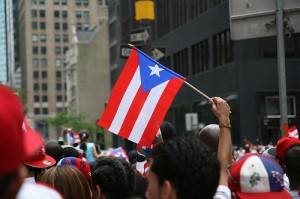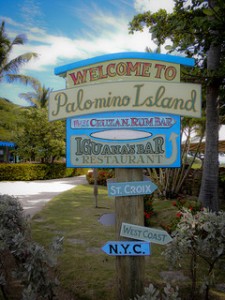
On November 6, 2012, the people of Puerto Rico voted to join the U.S. as its 51st state. Or did they?
The referendum was non-binding and was conducted in a two-step process. The first question asked whether Puerto Ricans were happy with the current Commonwealth status. Fifty-two percent of Puerto Ricans indicated they were not. The second question was a choice: independence, statehood, or a freely associated state (a revised Commonwealth status that would have granted independence with close connections to the U.S.). About 61% chose statehood, but that figure is misleading.
See, the Commonwealth Party asked voters not to answer the second question. Almost 500,000 voters left that question blank as a result. Thus, compared to about 810,000 votes for statehood, over one million (55%) actually voted against it. The referendum was anything but a clear indication that Puerto Ricans want statehood.

In addition, the people of Puerto Rico voted out Luis Fortuno and the pro-statehood party from the Governor’s office. Just four years after they handed Fortuno a landslide victory, they replaced him with the pro-Commonwealth Party candidate Alejandro Garcia Padilla. In a strange way, Puerto Rican voters went beyond thinking about statehood by making a statement about the global political-economic system. The referendum was a reflection of the terrible pain that severe inequality and globalization has brought to their Island.
This convoluted referendum process and outcome suggests Puerto Ricans are not necessarily looking for a new political status, but for a new economy. Puerto Rico is deeply polarized in class terms. There is a small rich upper stratum that lives well. But there is also a large (and growing) strata that lives below the poverty line (over 41%), is increasingly unemployed or underemployed (14%), has declining income. Many are able to live only because of government transfer programs, and over 30% of Puerto Rico’s GDP comes from federal transfers in the form of social security, Medicaid, and more. Over 37% of its people are receiving federal food stamps.
Inequality in Puerto Rico is higher than in most states. As measured by the Gini index—here, a measure of income inequality—Puerto Rico’s inequality is comparable to Washington, D.C.’s and higher than that of most states, even New York, Mississippi, and Missouri. It’s even higher than El Salvador’s. Puerto Rico has become an economy of extremes. Wealth and jobs exist at one small end, but a mass of unemployment and poverty lurks at the other larger end. Puerto Rico is a sort of harbinger of a U.S. economy that continues to move toward greater stratification.
This increasing class polarization paradoxically makes Puerto Rico attractive for some industries (pharmaceuticals, electronics, food products). It is a very productive economy: the Puerto Rican GDP is the highest among Latin American countries, and is even higher than Spain’s, according to most international economic data.The problem is that most of that productivity comes from what remains of the declining pharmaceutical industry. As one analyst described it, Puerto Rico is not an underdeveloped state, but rather “a developed economy that stopped growing.” Manufacturing is shrinking (in the 1990s, the loss of federal tax exemptions hastened this process), while government jobs make up about 30% of all employment, according to government indicators.
Puerto Rico has also already experimented with the kinds of toxic austerity policies that have been imposed on countries like Greece and that Republicans want to impose in the U.S. Fortuno’s regime made drastic cutbacks in government programs and jobs, and it privatizated many government services and assets. Further, Fortuno fired 17,000 government workers, froze all government salaries, and reduced government spending by 20% of the budget. In 2011, he granted a 40-year concession to Goldman Sachs and Albertis to profit from toll roads in exchange for $1.14 billion. When he lost re-election, Fortuno had plans to sell off or lease the Luis Munoz Marin International Airport, as well as energy, water, and public school infrastructure and transportation public assets.
These austerity policies and privatization were meant to deal with a hemorrhaging economy and its attendant tax deficits. They are also the result of increased competition from other Latin American countries after NAFTA and from general globalization. Since production and consumption remains dominated by the foreign sector, Puerto Rico has little room to maneuver. It must offer foreign firms an increasingly attractive package of lower taxes and wages, though jobs and income in the private and public sector are falling under these circumstances. This is a terrible economic and political vise. Puerto Rico cannot even devalue its own currency to boost its economy, since it uses U.S. dollars.

In the meantime, labor unions are vibrant, but on the defensive, as economists and political leaders push to solve economic woes by calling for even lower wages. The result is a bizarre hybrid economy in which workers survive only by making expert use of remaining public or private sector jobs, government transfer payments, and money generated from activities in the informal underground economy. This means that the route to independence holds great moral and political value, but such an abrupt move to independence would send hundreds of thousands of families into economic freefall—they truly are dependent on federal government transfer programs.
It is no wonder, then, that the referendum and recent elections suggest Puerto Ricans are fickle, responding with incredible suspicion to what their political leaders offer. They just don’t trust or know which political party can lead them out of the wilderness. But this indecisiveness is not so different from that of voters in the U.S. (where the electoral college numbers masked a much closer popular vote tally in the presidential election); Puerto Ricans, too, have little confidence about how to best move forward in a world where the U.S. is no longer immune to global economic pressures and political incompetence.
Voting this way, Puerto Ricans were, as they have so often in the past, leading the way for others—including other U.S. citizens. Puerto Ricans have exposed the serious unmet challenges of the global economy and have rejected the fiscal austerity solutions offered in Puerto Rico, in the wider U.S. by the Republican Party, and to the world by neo-liberal regimes. The shameful police attack on students protesting at the University of Puerto Rico in 2011 was the most glaring, but certainly not the only, example of this battle. The November vote was not clear, binding, or any kind of solution.Recommended Reading
Jorge Duany. 2001. The Puerto Rican Nation on the Move: Identities on the Island and in the United States. A brilliant reminder that any understanding of Puerto Rico must come to grips with the blurred and divided identity of Puerto Ricans. Their racial, national, and political identity overlaps, conflicts, and is shared between the Island and the U.S., and Puerto Ricans remain connected to a cultural sense of national difference even as they continue to move back and forth between the island and the U.S. mainland.
Gordon K. Lewis. 1963. Puerto Rico Freedom and Power in the Caribbean. Still one of the best historical analyses of Puerto Rico’s long colonial experience and how it continues to haunt and shape the island’s contemporary politics and economy.
Frances Negrón-Muntaner. 2007. None of the Above: Puerto Ricans in the Global Era. A stellar collection of some of the most astute and fascinating thinking about Puerto Rico’s politics, culture, and global identity.

Comments 3
Friday Roundup: November 30, 2012 » The Editors' Desk — April 1, 2014
[…] “Puerto Rico: 51st State or Harbinger of U.S. Decline?” by José Rámón Sánchez. In which Sánchez takes a closer look at the much-heralded “statehood vote” in Puerto Rico and finds it’s not so much about statehood as economic woes. […]
Emmanuel Caceres — January 9, 2017
Excuse no more please enough 50 is better
Frank Torres — June 4, 2018
A honest appraisal. Puerto Rico a Latin American nation, currently occupied and controlled by the US after an 1898 invasion.